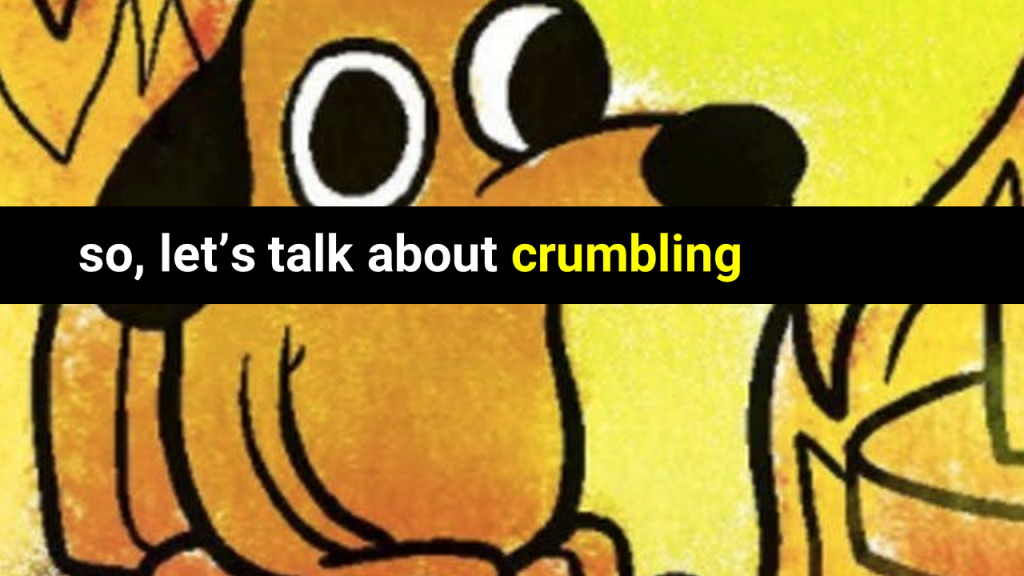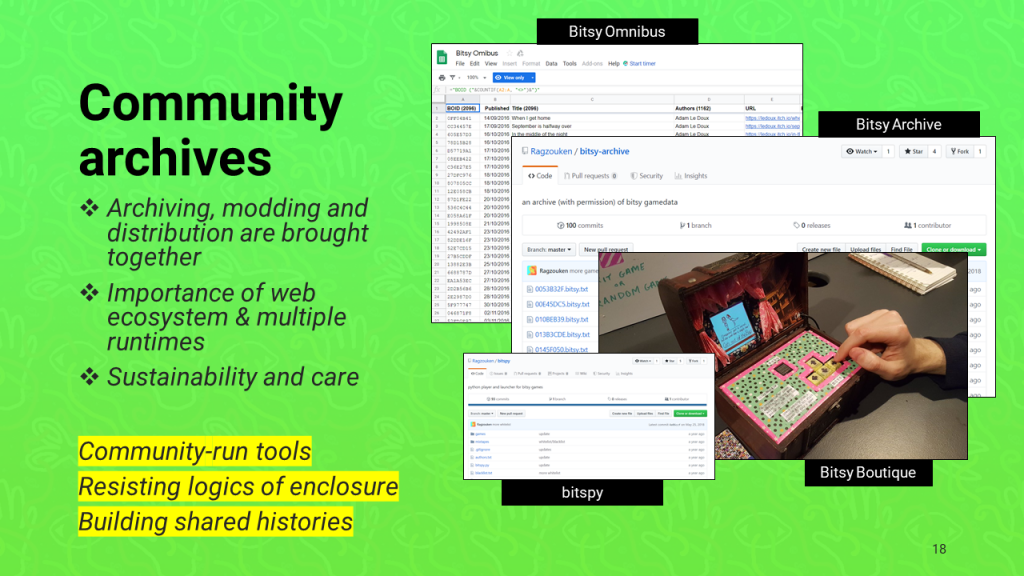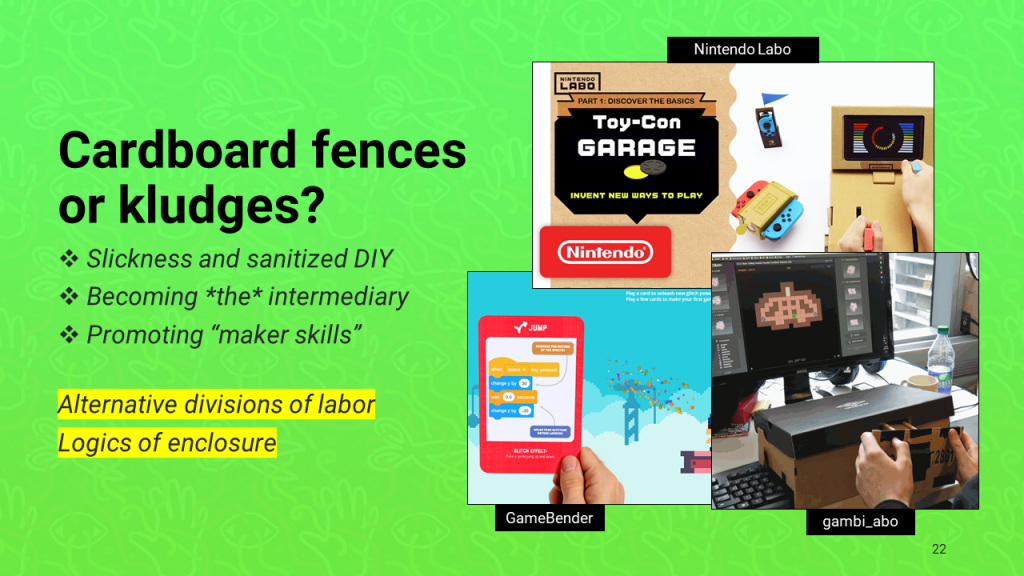I was part of the Program Committee, reviewing papers on serious games and simulations, for the joint International Conference on Entertainment Computing (ICEC-2019) and Conference on Serious Games (JCSG-2019) conferences, hosted in Arequipa, Peru.
Category: Research
Research-creation projects, publications, conferences, talks, and other research-focused projects.
Demo and Doctoral Consortium at DIS 2019
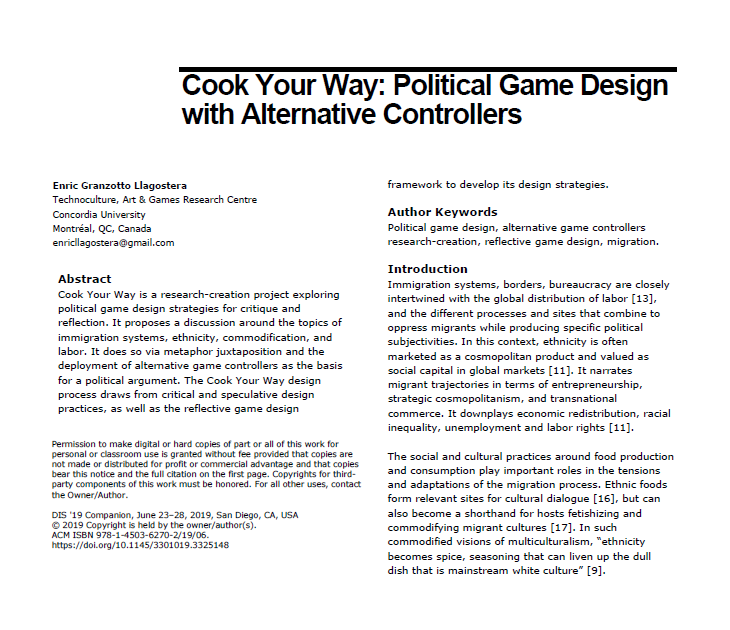
I presented my game Cook Your Way as a demonstration and also participated in the doctoral consortium at the Designing Interactive Systems (DIS) 2019 in San Diego, USA.
My participation at DIS 2019 resulted in two extended abstracts published in the conference proceedings. Here they are (click on the title to download a PDF):
Granzotto Llagostera, Enric. 2019a. “Cook Your Way: Political Game Design with Alternative Controllers.” In Companion Publication of the 2019 on Designing Interactive Systems Conference 2019 Companion, 25–28. DIS ’19 Companion. New York, NY, USA: ACM. https://doi.org/10.1145/3301019.3325148.
Granzotto Llagostera, Enric. 2019b. “Critical Controllers: How Alternative Game Controllers Foster Reflective Game Design.” In Companion Publication of the 2019 on Designing Interactive Systems Conference 2019 Companion, 85-88. DIS ’19 Companion. New York, NY, USA: ACM. https://doi.org/10.1145/3301019.3324872.
On Crumbling Platforms at CGSA 2019
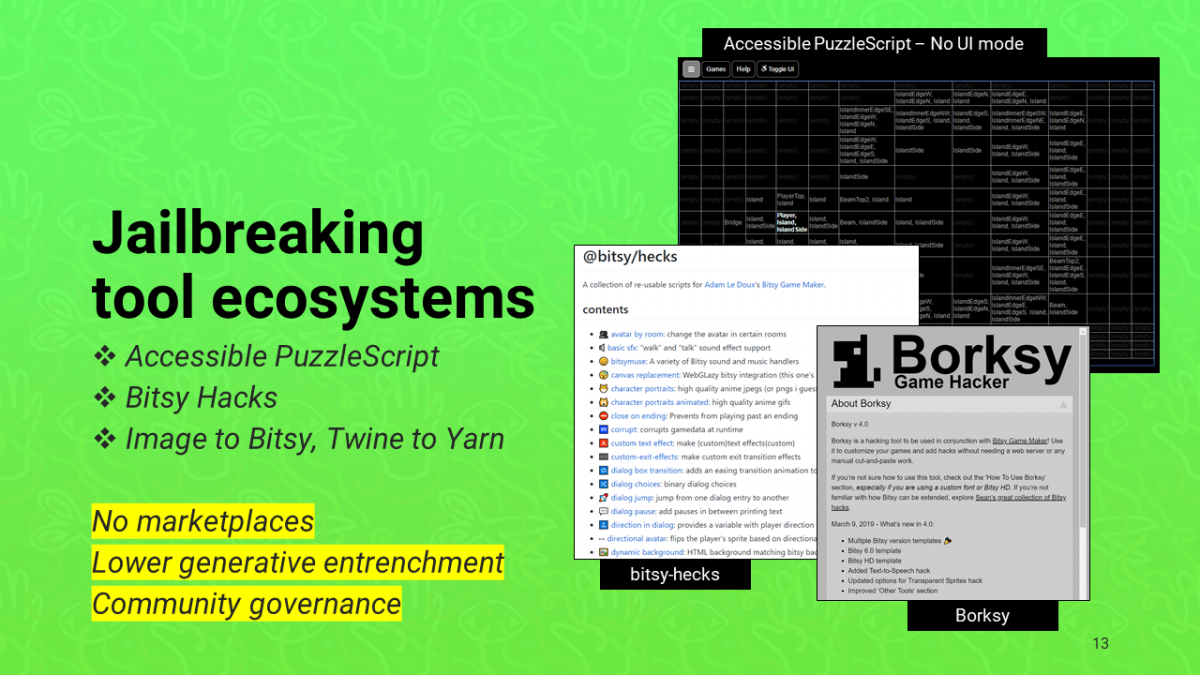
I presented a talk on game making tools as sharing practices as part of the Sharing Games: Proliferation, Posterity, Practice panel of the CGSA 2019 conference.
Here is the description of the presentation and some of its slides.
Game making is a loosely connected set of situated practices which involve a diverse, entangled arrangement of materials, knowledges, and repertoires. The notion of industrial pipelines for digital game making is inadequate to describe this diversity. Different communities create tools and processes and then circulate and appropriate them in ways that combine play, work, and creation beyond professionalized, commercial development. The design of such tools both supports and is shaped by the practices around them. Examining this relationship is a messy affair, but is key to positioning such practices: questions of gatekeeping, political positioning, and critical literacy are intertwined with how such tools and practices materialize and present game making.
In my presentation, I will look at different digital game making tools in terms of their game formats, arrangements of use and circulation, and how they support hybridity of hardware / middleware / software. What roles do these features play in circulating diverse visions of game making? My case studies range from fantasy consoles (PICO-8), to free and open-source standalone game engines (Superpowers, Duality), web-based tools (Bitsy), smartphone game making tools (Flatpack), and in-game editors in commercial consoles (Nintendo’s Toy-Con garage). The focus of analysis is not on the game design features of games created with such tools, but on the usually hidden and assumed overall systems of objects and interpersonal relationships (Burckhardt, 2012, p.165) around them. Throughout this close analysis, I examine tension lines and highlight intersections for critical design interventions and an active engagement with how game making circulates.
Works cited
Boluk, S., & LeMieux, P. (2017). Metagaming: Playing, Competing, Spectating, Cheating, Trading, Making, and Breaking Videogames. Minnesota, UNITED STATES: University of Minnesota Press. Retrieved from http://ebookcentral.proquest.com/lib/concordia-ebooks/detail.action?docID=4745543
Buechley, L., Rosner, D. K., Paulos, E., & Williams, A. (2009). DIY for CHI: Methods, Communities, and Values of Reuse and Customization. In CHI ’09 Extended Abstracts on Human Factors in Computing Systems (pp. 4823–4826). New York, NY, USA: ACM. https://doi.org/10.1145/1520340.1520750
Burckhardt, L. (2012). Design is Invisible in Lucius Burckhardt Writings: Rethinking Man-made Environments: Politics, Landscapes & Design. (J. Fezer & M. Schmitz, Eds.). New York: SpringerWienNewYork.
Galloway, A., Brucker-Cohen, J., Gaye, L., Goodman, E., & Hill, D. (2004). Design for Hackability. In Proceedings of the 5th Conference on Designing Interactive Systems: Processes, Practices, Methods, and Techniques (pp. 363–366). New York, NY, USA: ACM. https://doi.org/10.1145/1013115.1013181
Harvey, A. (2014). Democratization, depoliticization, and the queering of game design. GAME – The Italian Journal of Game Studies, 1(03), 13.
Freedman, E. (2018). Engineering Queerness in the Game Development Pipeline. Game Studies, 18(3). Retrieved from http://gamestudies.org/1803/articles/ericfreedman.
Cook Your Way
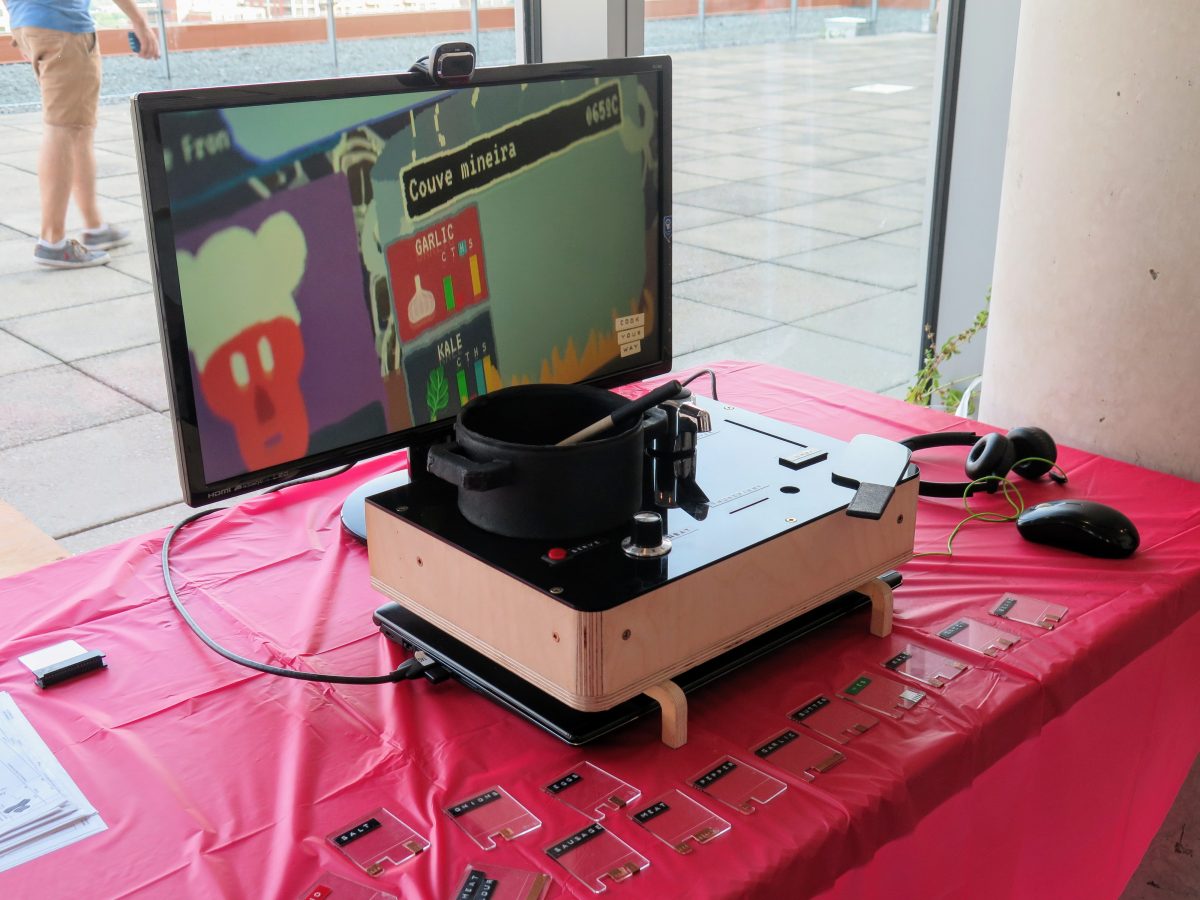
In Cook Your Way, visa applicants (i.e. the players) are tasked with cooking a typical dish of their country of origin using a cooking station. Immigration authorities then evaluate applicants according to their efficiency and potential to contribute to the new country’s society. Cooking becomes a standardized test, one step within a longer application process. This game is a research-creation project created during my doctoral research on alternative controller games at Concordia University. You can visit the project’s website here.
Awards
2020 – Winner of the Explorer award at the AMAZE. Berlin festival 2020.

Exhibitions and showcases
2023 – Art et/ou jeu : symbiose ou dissonance ? at Centre Culturel Canadien as part of ISEA 2023 – Paris, France.
2023 – JEU_ART_GAME exhibition at Centre BANG – Chicoutimi, Québec, Canada.
2023 – JEU_ART_GAME exhibition at Elektra – Montréal, Québec, Canada.
2022 – Pelipoikilo – Kouvola, Finland.
2022 – PLAYTIME 20.22 exhibition at Culturcentruum Bruges – Bruges, Belgium.
2022 – JEU_ART_GAME exhibition at Sporobole – Sherbrooke, Québec, Canada.
2020 – Explorer Award at A MAZE festival – Berlin, Germany.
2019 – alt.ctrl.GDC 2019 at Game Developers Conference 2019** – San Francisco, CA, USA.
2019 – Demo at Designing Interactive Systems conference – San Diego, USA.
2019 – Artcade – Montréal, Québec, Canada
Press
2019-08-09 – Rock Paper Shotgun – In Cook Your Way you must cook a meal with a strange controller to get through immigration
2019-02-26 – Game Developer – Alt.Ctrl.GDC Showcase: Cook Your Way
Credits
Cook Your Way was created by Enric Granzotto Llagostera.
Videos, photography and documentation graphics by Vjosana Shkurti.
Music from https://filmmusic.io: “Modern Jazz Samba” by Kevin MacLeod. Licence: CC BY. Intro music by John Bartmann.
French translation and localization by Jess Rowan Marcotte.
I would like to thank a few folks for their ongoing support and various contributions to this project: Carolina Chmielewski Tanaka, Rilla Khaled, Rebecca Goodine, Jess Rowan Marcotte, Dietrich Squinkifer.
Cook Your Way was created with the support of a Hexagram Student Grant and the Reflective Game Design research group.
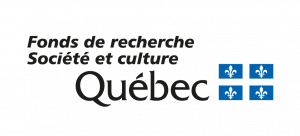
This project was partially funded with the support of the Fonds de recherche du Québec – Société et culture (FRQSC), as part of the Doctoral Research Scholarship 2020-B2Z-276952.
Citation
Granzotto Llagostera, Enric. 2019. Cook Your Way. Videogame with alternative controller. https://enric.llagostera.com.br/cookyourway.
Related publications
Granzotto Llagostera, E. and Khaled, R. 2023. On Cooking a Sour Game. Journal for Computer Games Criticism, Volume 5, Bonus Issue: Surviving Whiteness in Games. https://gamescriticism.org/articles/llagosterakhaled-5-a.
Granzotto Llagostera, Enric. 2019a. “Cook Your Way: Political Game Design with Alternative Controllers.” In Companion Publication of the 2019 on Designing Interactive Systems Conference 2019 Companion, 25–28. DIS ’19 Companion. New York, NY, USA: ACM. https://doi.org/10.1145/3301019.3325148.
Granzotto Llagostera, Enric. 2018. “The Design Process of Cook Your Way.” Conference panel presented at the 2018 Canadian Game Studies Association (CGSA/ACÉV) Annual Conference, University of Regina, Regina, Saskatchewan.
Doctoral Colloquium at AoIR 2018
This doctoral colloquium was a great opportunity to get early feedback on my research directions from peers and experienced faculty. I presented a position paper with an outline of my research proposal, titled “Critical controllers: how alternative game controllers foster reflective game design”.
Designing Cook Your Way at CGSA 2018
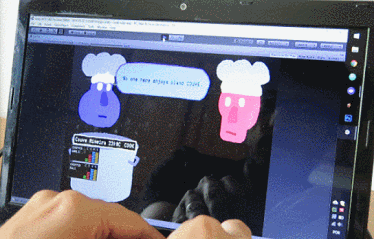
I went to Regina, Saskatchewan, from 29 May to 03 June, to participate at the 2018 Annual Conference of the Canadian Game Studies Association (CGSA). The conference was part of the 2018 Congress of the Humanities and Social Sciences.
In the event, I presented a talk in a panel which featured my fellow student members (Jess Rowan Marcotte, Dietrich Squinkifier, and Rebecca Goodine) of the Reflective Games research group, directed by Dr. Rilla Khaled. Our panel showcased and discussed the group members’ research-creation work, focusing on design approaches and how our projects aim to encourage critical reflection in games and their design.
My individual talk at the panel (about the design process of Cook Your Way, a political game discussing the experience of migrants in relation to issues of identity and otherness) also sparked interesting conversations with other researchers. Topics discussed ranged from the representation of power in the game to how the different layers of design in the game reinforced its message and reflection through play.

Indie Interfaces
In September 2017, Anita Cavaleiro and I presented a talk about indie dev meetups in Brazil at the Indie Interfaces conference at Concordia University in Montréal. More info about that event can be found here.
On Gamification and Persuasion
This paper was presented at the SBGames 2012, the Brazilian Symposium of Games and Digital Entertainment, and it can be downloaded here. Here is its abstract:
The discussion around gamification has been gaining
strength in recent years, and game scholars are
focusing on the term and the phenomena it describes.
The main goal of this paper is to contribute to this
discussion by understanding the gamification
phenomenon from the perspective of the persuasive
questions it poses, both as a discursive term and as
persuasive systems. The paper shortly reviews current
debates around the gamification term and present
definitions, as a basis for the analysis of gamification
and persuasion. A description of the rhetorics of
gamification is then made, discussing the positioning
of gamification in relation to video games and larger
cultural and societal contexts. Next, the persuasive
characteristics of gamification systems are analyzed
using concepts of persuasive technologies and
procedural rhetorics, highlighting the connections
between those characteristics and the gamification
rhetorics described.
Criticality in Game Design Practice

As a result of my research during my MSc in Games at the IT University of Copenhagen, I wrote this thesis discussing criticality as a productive stance for game creators, drawing from different fields such as popular education and social movements in Latin America and views of criticality in design, game design and play. The thesis can be downloaded here. Here is its abstract:
Games and play are currently seen as having relevant impacts in changing a variety of spheres of people’s lives, such as work, education, and political action. However, many times games and play are uncritically deployed, as if they existed in a social and political vacuum, ready to be used whenever appropriate. The present research explores the concept of criticality as a productive perspective for problematizing such efforts of changing the world through games and play, with a special focus on game design, bringing to the discussion views from outside the game studies and design domain.
Criticality in game design is two-fold. First, it can mean creating games and play centered on the idea of performing critique and challenging dominant hegemonic values, beliefs and conventions, maybe supporting or creating spaces for change. With that in mind, I investigate existing formulations of criticality in play and games, analyzing the most important elements of that relationship that can affect game design. Secondly, criticality in game design can refer to taking it as a guiding principle or stance during the design practice of game designers, informing design goals, processes and other aspects of game design, turning it into a critical activity itself. In order to understand how criticality can affect design practice, I review and analyze a diversity of critical approaches to design and game design.
Finally, a synthesis of the more relevant elements and themes raised in these detailed analysis is produced, aimed at providing insight and productive questions to the practice of game designers engaged in critical efforts.
